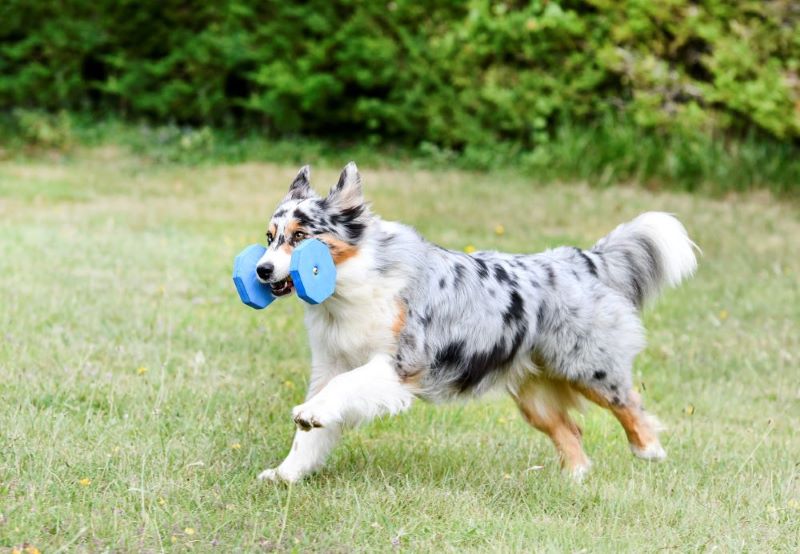Get Pet Insurance for your Cat & Dog

Zero
Documentation
Quick
Claim Process
Affordable
Premium
Terms and conditions apply*
- {{species}}
- {{indoorOutdoor}}
- {{suminsured}}
Australian Shepherd Dog Breed Characteristics & Information

Australian Shepherd Dogs, often lovingly referred to as "Aussies," are a remarkable breed of herding dogs that have captured the hearts of dog enthusiasts worldwide. With their striking appearance and unmatched intelligence, these dogs have earned a special place in the homes of many.
In this comprehensive guide, we will explore what makes Australian Shepherds special, their distinctive characteristics, proper care, and training, as well as common health concerns.
What Defines Australian Shepherd Dogs?
Australian Shepherds are quick learners and easily pick up new commands and tricks. Their striking appearance, characterised by a beautiful merle coat and mesmerising blue or heterochromatic eyes, makes Australian Shepherds stand out in a crowd.
Australian Shepherds can be challenging for first-time owners due to their high energy and need for mental stimulation. They can make good house dogs with proper training and regular exercise to keep them mentally and physically engaged.
What are the Characteristics of Australian Shepherd Dogs?

Understanding the characteristics of Australian Shepherds is essential for anyone considering bringing one into their home. Here are the key characteristics:
- Life Span: Australian Shepherds typically have a lifespan of 13 to 15 years. With proper care and attention, they can enjoy a long and healthy life.
- Height: Adult Australian Shepherds stand between 51 to 58.5 cm tall, with males usually being slightly larger than females.
- Colour: Aussies come in a variety of coat colours and patterns, including black, blue merle, red, and red merle.
- Weight: The weight of an Australian Shepherd can range from 15.9 to 31.8 kg, with males typically being heavier than females.
- Behaviour and Personality: They tend to be protective of their families, displaying friendliness, affection, and vigilance towards kids and other pets.
- Living Condition: Aussies are adaptable dogs and can live in various environments. However, they are most content in homes with a yard where they can run and play.
- Breed Group: Australian Shepherds are classified as a herding breed by the American Kennel Club (AKC).
- Coat: The Australian Shepherd's double coat is medium-length and weather-resistant.
- Temperament: Known for adaptability, Aussies have a lively temperament. They are vigilant watch dogs, quick learners, and benefit from early socialization.
- Isolation Period: Australian Shepherds may struggle with being left alone for extended periods. They can develop behavioural issues if isolated for long durations.
How to Train Australian Shepherd Dogs?

Training an Australian Shepherd is fun and easy because they're smart and quick to learn. Here are some important training tips:
- Socialisation: Start socialising your Australian Shepherd from a young age. Expose them to various people, animals, and environments to ensure they become well-adjusted and confident adults.
- Basic Commands: Teach your Aussie basic commands like sit, stay, come, and down. Consistent training methods work best with this breed. Establishing a foundation in obedience is crucial for a well-behaved dog.
- Leash Training: Begin leash training early to ensure your Australian Shepherd walks on a leash without pulling. Regular walks are essential to burn off their energy and it builds a strong connection between you and your dog during walks.
- Crate Training: Crate training can help with housetraining and providing a safe space for your dog. Make the crate a comfortable and positive place, and never use it for punishment.
- Agility Training: Australian Shepherd dogs excel in agility training due to their athleticism and intelligence. Set up an agility course in your yard or consider enrolling in agility classes.
- Use Treats and Praise: Reward-based training is highly effective with Australian Shepherds. Use small treats and enthusiastic praise to reinforce good behaviour. This enhances their eagerness to learn and cooperate.
- Herding Behaviour Training: Train them to redirect the herding behaviour appropriately to prevent nipping or chasing. Teaching them specific commands for herding can help them manage their instincts.
- Potty Training: While Australian Shepherds are generally intelligent and fast learners, potty training success depends on consistency and patience. Establish a fixed schedule, take them out frequently, and encourage desired habits.
What are the Pros and Cons of Having Australian Shepherd Dogs?
It’s important to consider the pros and cons that may come with welcoming an Australian Shepherd into your home.
Pros:
- Easy to Train: Australian Shepherds stand out for their intelligence and eagerness to learn, making them highly trainable and obedient. Their quick grasp of command and desire to please make them ideal companions for those seeking a responsive dog.
- Climate Adaptable: Whether you reside in a warm, tropical region or a colder climate, the Australian Shepherd's adaptable nature ensures they can thrive in a range of environmental conditions.
- Size: Australian Shepherds, with a size between small and medium, are ideal for apartment or yard living, appealing to diverse dog owners due to their versatility in various living situations.
Cons:
- Behavioural Issues: Australian Shepherds may exhibit undesirable behaviours such as excessive barking, digging, or herding, especially in the absence of a designated task.
- Many Health Problems: Australian Shepherds are prone to various health issues, necessitating vigilant health care and potential financial considerations for owners.
What are the Health Problems with Australian Shepherd Dogs?
Australian Shepherd dogs are usually in good health, but like any dog, they can sometimes have certain health issues. Here are five common health problems:
Cataracts: Aussies may develop cataracts, which can affect their vision. Regular eye check-ups can help detect and manage this condition.
Hip Dysplasia: Hip dysplasia is a hereditary condition in this breed, where the hip joint doesn't develop properly. It can lead to pain and arthritis
Autoimmune Disease: Australian Shepherd dogs can be susceptible to autoimmune diseases, which can affect various parts of the body.
Epilepsy: Epilepsy is a neurological disorder that can affect some Australian Shepherds. Medication can help manage seizures in affected dogs.
- Elbow Dysplasia: Elbow dysplasia is a condition in Australian Shepherds, where the elbow joint doesn't form correctly, leading to lameness and discomfort.
How to Take Care of Australian Shepherd Dogs?

Caring for an Australian Shepherd involves catering to their unique requirements. Below is a detailed instructions on how to properly look after your Aussie friend:
Diet and Nutrition: When deciding on the best food for your Australian Shepherd, opt for a diet that includes premium animal-derived protein options like beef, chicken, turkey, lamb, duck, eggs, and fish.
Feeding: You may feed two meals a day to adult Australian Shepherds, as they may consume 1.5 to 3.5 cups of good-quality food. Adults who are really active, however, might need more meals to satisfy their energy demands.
Grooming: Aussies have a dense double coat that requires regular grooming. Brush them a few times a week to reduce shedding. Regular grooming also helps distribute natural oils, keeping their coat healthy.
Exercise: Aim for at least 60-90 minutes of physical activity every day, including walks, runs, and playtime. Mental stimulation through toys and training is equally important to prevent boredom.
Dental Care: Dental hygiene is essential for your Aussie's overall health. Brush their teeth regularly, offer dental chews, and consider annual dental check-ups. Good dental care can prevent dental problems.
Ear Care: Check your Australian Shepherd's ears regularly for signs of infection, such as redness, odour, or excessive wax buildup. Clean their ears as needed, but avoid inserting anything deep into the ear canal to prevent injury.
Bathing: Australian Shepherd dogs don't need frequent baths. Bathe them only when necessary, usually every few weeks, or when they get dirty. Use a dog-specific shampoo, and be sure to thoroughly rinse and dry their coat to prevent skin issues.
Australian Shepherd dogs make wonderful companions for active families and individuals who can provide them with the care, exercise, and mental stimulation they need. With proper training and attention to their specific needs, Australian Shepherds can not only love family members but also excel in various roles, from herding to dog sports.












